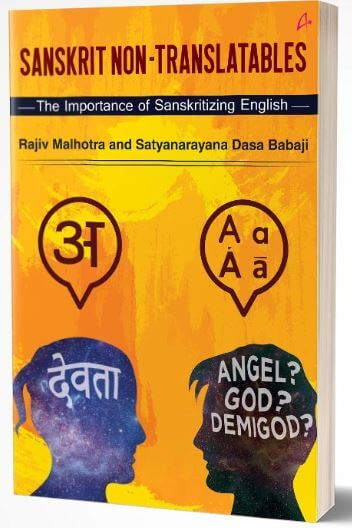22nd July 2023 – Do you think that ‘religion’ is the correct equivalent of ‘Dharma’ in English? Are you also in a habit of calling ‘God’ or ‘Lord’ instead of ‘Bhagwan’ or ‘Devta’? Do you believe that ‘atma or jivatma’ is the same as ‘soul’?
If you have answered ‘yes’ to any of the above questions, then some of the below things are true about you.
- Most likely, you were English educated
- Your knowledge about Sanskrit is minimal
- Your language needs a de-colonization
But loose no heart. This is a common problem for several of us. Fortunately, there is a solution.
“Sanskrit Non-Translatables – The Importance of Sanskritizing English” is one of those modern literary marvels which goes in-depth to explain the meanings of over 50 Sanskrit words or Hindu concepts which have been lost in translation. The authors Rajiv Malhotra and Satyanarayana Dasa Babaji have undertaken a daring project to help de-colonize the Hindu mind.
Though the book was first published in 2020, it is timeless.
Now to give you some perspective on how important this is to de-colonize the Hindu mind, let us take a small illustration. This example may give you an idea about how important it is to Sankritize English. Commonly, lot of Hindu devtas including Shiva, Rama, Vishnu, Krishna are shown in ‘blue’ color. Now, the literal translation in English will either be blue skinned god or dark-skinned god. In the former, the translation is correct but there is no ‘bhava’. In the latter, neither the translation nor the ‘bhava’ is apt.
Another example is the word Dharma. If one assumes that religion is the correct translation for Dharma, then how is one ever going to explain Sanskrit words such as raj-dharma, dharma-chakra, pitri-dharma, etc?
We are giving here an exclusive excerpt from the book which further elaborates the significance of the subject matter.
“Sanskrit is an ever-creative language in which each word is the parent and source of ideas. A letter is called akshara, which means ‘imperishable’. Akshara is the eternal sound and it does not perish but reveals the entire secret of speech. Another term for letter is varna (hue or color). Thus, every letter is heard as a sound with a corresponding visual hue as it manifests. Rishi-s are said to have seen and not just heard, the Veda-s. The term for alphabet, varnamala, means ‘garland of colors’ or qualities or hues which an artist uses to paint reality”.
The book can be order online. (Click here). We enjoyed reading it and made it part of our Dharmic library. Hope you will find it interesting too. Happy de-colonizing!

